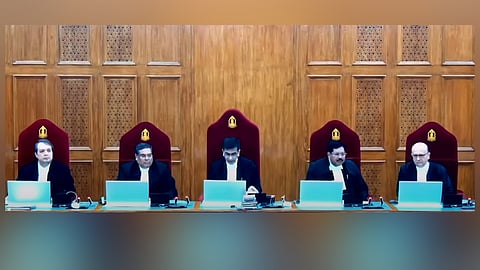

NEW DELHI: In a landmark judgement, the Supreme Court on Thursday held that the electoral bonds scheme has to be struck down with immediate effect as it is unconstitutional. It directed banks to cease the sale of the bonds immediately.
The five-judge bench of the top court, headed by the Chief Justice of India (CJI) Dr Dhananjaya Yeshwant Chandrachud, said that that anonymous electoral bonds violate the Right to Information Act (RTI) and the Article 19(1)(a) of the Constituition (all citizens shall have the right to freedom of speech and expression).
The bench said the fundamental right to privacy also includes citizens' right to political privacy and affiliation.
It also directed the State Bank of India (SBI) to disclose details of the poll bonds encashed by political parties from April 12, 2019 till date to the Election Commission of India (ECI) by March 6, who is then supposed to publish the information on the ECI website by March 13, 2024.
"The SBI (State Bank of India) must disclose each encashment to the EC within three weeks," the top court bench said.
The SBI has been directed to mention the names of the contributors to the six-year-old scheme with other key details including date of encashment and currency denomination.
The SC also directed political parties to return all electoral bonds which are within the 15-day validity period but which have not yet been enchased, to the purchasers.
"The Union has been unable to establish that the measure adopted in clause 7(4)(1) of the electoral scheme is the least restrictive measure," the SC said in its order.
The top court also held as invalid the amendments made in various laws, including Section 29C of the Representation of Peoples (RP) Act and the Income Tax laws.
The CJI, while reading out the verdict, also said that the amendment to the Companies Act (allowing blanket corporate political funding) is unconstitutional.
CJI Chandrachud also asserted that curbing black money could not infringe the RTI, adding that there were other alternatives to restrict black money.
The top court which was delivering its verdict on a batch of petitions challenging the validity of the electoral bonds scheme, which allows for anonymous funding to political parties, said at the onset that there were two separate but unanimous verdicts on the matter.
The scheme was challenged by the Association for Democratic Reforms (ADR), the Communist Party of India (Marxist), Congress leader Jaya Thakur, and Spandan Biswal.
Background
The electoral bonds scheme, which was notified by the government on January 2, 2018, was pitched as an alternative to cash donations made to political parties as part of efforts to bring in transparency in political funding.
According to the provisions of the scheme, electoral bonds may be purchased by any citizen of India or entity incorporated or established in the country. An individual can buy electoral bonds, either singly or jointly with other individuals.
Critics have said this eliminates transparency in electoral funding and gives an edge to the ruling parties.
Only the political parties registered under Section 29A of the Representation of the People Act, 1951 and which secured not less than 1 per cent of the votes polled in the last elections to the Lok Sabha or a state legislative assembly are eligible to receive electoral bonds.
According to the notification, electoral bonds shall be encashed by an eligible political party only through an account with an authorised bank.
A five-judge Constitution bench headed by CJI Chandrachud had on November 2 last year reserved its verdict in the matter.
In April 2019, the apex court had declined to stay the electoral bonds scheme and made it clear that it would accord an in-depth hearing on the pleas as the Centre and the Election Commission had raised "weighty issues" that had "tremendous bearing on the sanctity of the electoral process in the country".
The Constitution bench, also comprising Justices Sanjiv Khanna, B R Gavai, J B Pardiwala and Manoj Misra, had on October 31 last year commenced hearing arguments on the four petitions, including those filed by Congress leader Jaya Thakur, the Communist Party of India (Marxist) and NGO Association for Democratic Reforms (ADR).
During the hearing in the matter, the apex court had underscored the need for reducing the cash component in the electoral process.
(With additional inputs from Online Desk and PTI)